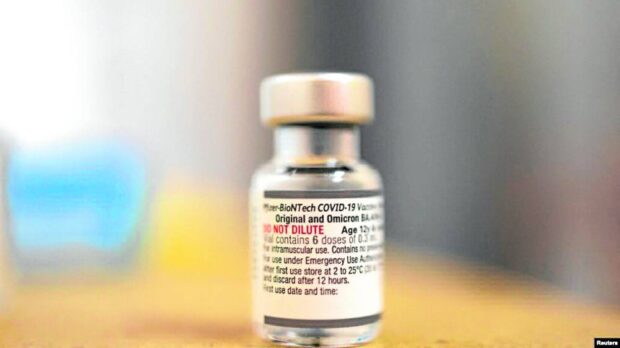
This file photo shows a vial of the Pfizer-BioNTech COVID-19 booster shot. (REUTERS FILE PHOTO)
MANILA, Philippines — In a race against time, the Department of Health (DOH) has opened to adults with comorbidities the administration of Pfizer bivalent jabs as their boosters less than a month before the shelf life of the nearly 400,000 donated vaccines expire.
In a Viber message to reporters on Saturday, the DOH confirmed that the A3 priority group, or those with comorbidities age 18 and up, may now receive the bivalent vaccines at public health facilities and vaccination centers, provided they already had jabs at least four months prior.
Extensible for another month
The health agency made the clarification after Secretary Teodoro Herbosa revealed in a radio interview on Friday the decision to widen the coverage as the remaining bivalent vaccines that came from the Lithuanian government are set to expire on Aug. 31.
In fact, Herbosa noted, this initial batch of next-generation COVID-19 jabs already expired on July 31 and was extensible only for another month.
Former DOH officer in charge Maria Rosario Vergeire said in March that about 15.3 million COVID-19 jabs in the country are set to expire until October, raising the current vaccine wastage to almost 60 million doses by the latter part of 2023.
Since then, DOH has not provided new figures on the number of expiring vaccines in the government inventory.
With the lifting of the public health emergency status due to the COVID-19 pandemic, President Marcos on July 21 ordered the distribution of the remaining jabs with emergency use authorization under the government’s COVID-19 vaccination program to continue for one year. After that, manufacturers will need a license to commercially sell and distribute the shots.
40,000 individuals who availed
The latest available DOH data showed that only 48,354 individuals availed of the 391,860 bivalent vaccines as their third booster shot as of July 14.
DOH first rolled out the bivalent vaccines to healthcare workers and the elderly on June 21.
Herbosa earlier said his agency is still pursuing negotiations with COVAX facility for the possible shipment of two million doses of bivalent COVID-19 jabs to the Philippines this year.